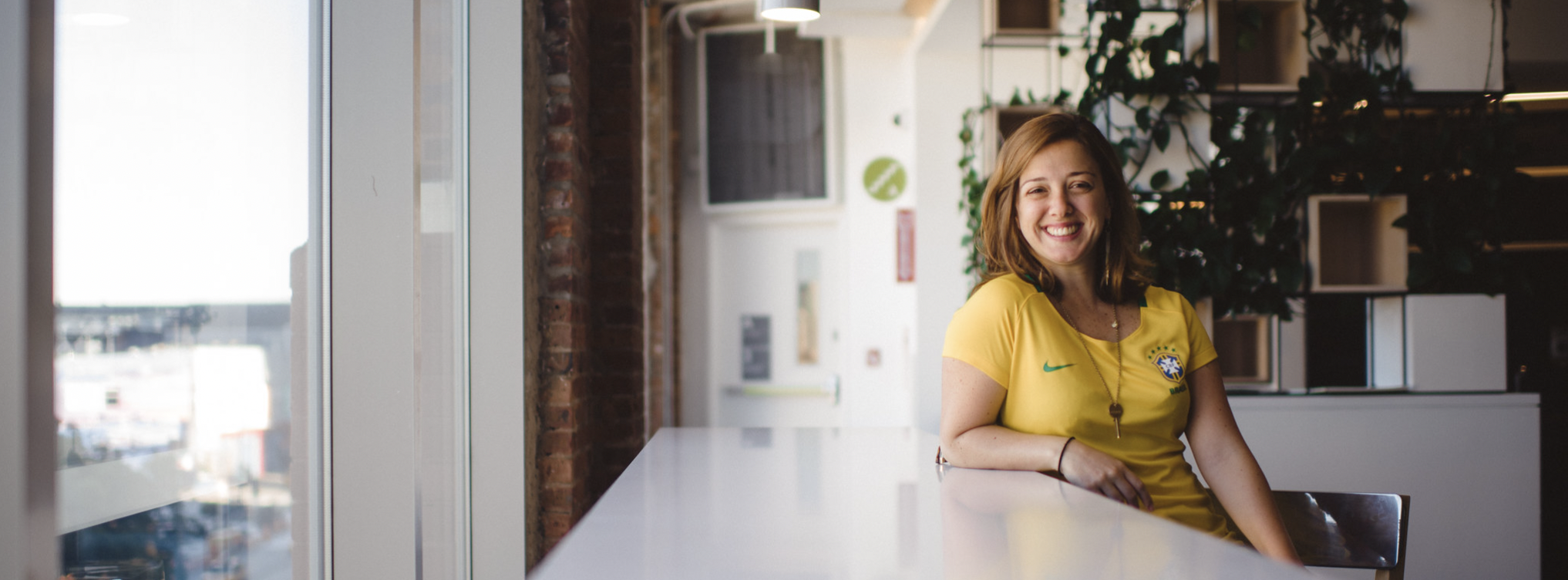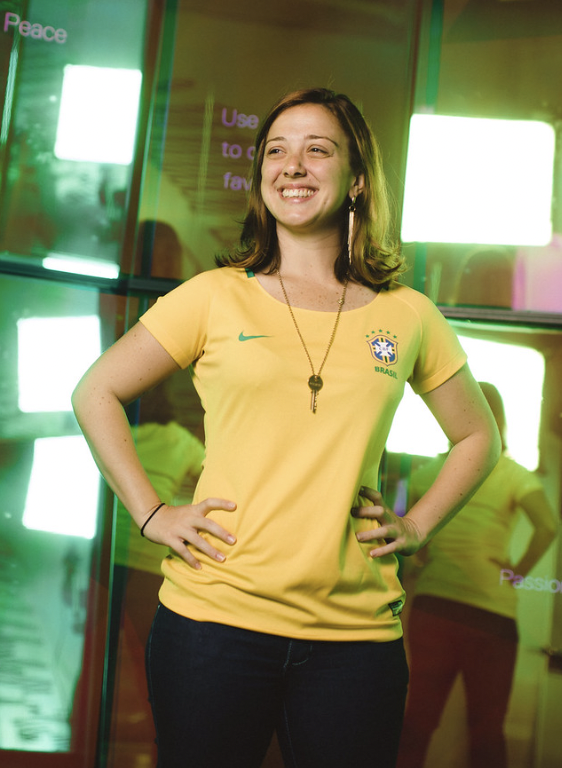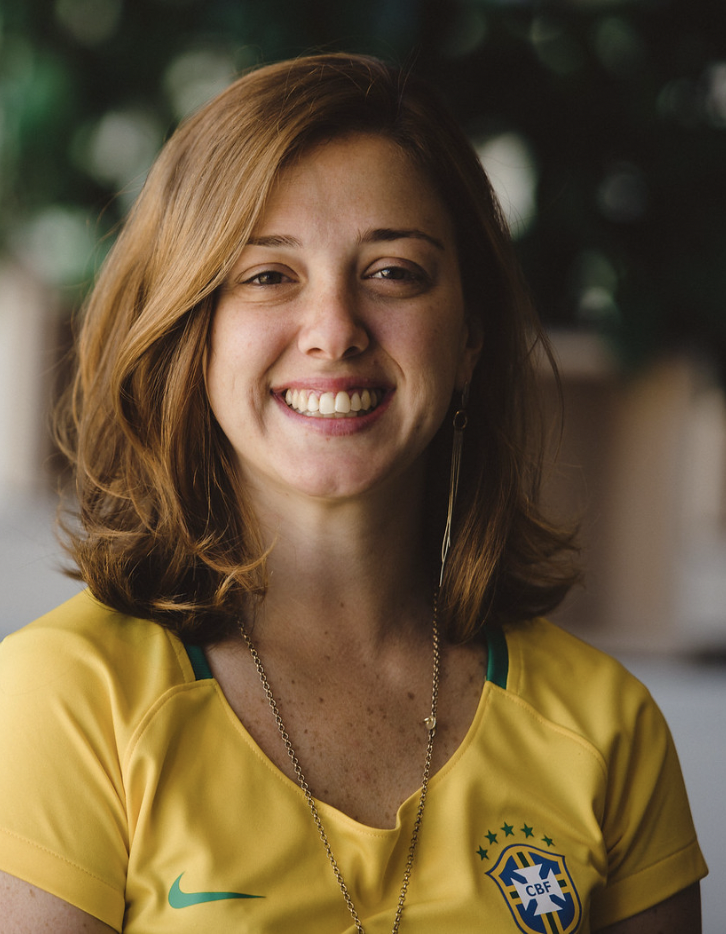
Júlia had a job as an analyst in the largest bank in Latin America, and she was advancing in her career only three years into the job. The opportunities for growth and development in this field were numerous, but her heart was somewhere else. Her heart was on the soccer pitch.
While working at the bank, Júlia came up with an idea for a non-profit organization that would promote soccer among girls. She spent her spare time searching for help to develop her idea, but she wasn’t gaining much traction. Júlia says the stagnation was because she was still viewing the non-profit as a hobby and not her career. Eventually, the idea faded into the background, and Júlia continued to concentrate on her work as an analyst. That same year, however, soccer marched back into the forefront when Júlia met and joined a group of women who played soccer after work. Right away, Júlia saw potential. She drew up an analysis of what could be, set up a meeting with the leader of the soccer group, and pitched her idea. The leader loved it.
“She said it was exactly what she envisioned as the future for Pelado Real,” Júlia says, “and that she needed a partner.” Júlia had found a sense of community and belonging with the Pelado Real club, and she wanted that for other girls and women of Brazil. She knew that, in order to make this work, she had to dedicate herself to it. She quit her job at the bank out of what she calls “not a choice, but a sense of duty,” and followed her dream.

Growing up in Sao Paulo, Júlia lived within walking distance of Sao Paulo FC’s stadium, so soccer has always played a huge role in Júlia’s life. Being the only girl in a houseful of boys didn’t deter her; she played soccer religiously with her brothers and male cousins and watched games with her parents. Júlia’s parents really wanted her to participate in sports, and allowed her to practice tennis, gymnastics, handball, swimming, and volleyball, but soccer only became a reality when she went to the United States at age 16 on a high school exchange program.
Soccer transformed and empowered Júlia’s life, and she was more than ready to provide that same opportunity to Brazil’s girls and women. She could see the potential of Pelado Real becoming bigger, but Pelado Real didn’t generate a profit for two years, which meant Júlia didn’t have a salary. The fact that most of Brazil’s small businesses don’t last more than two years crept into her mind, and this paired with no salary created some doubts. “During this time,” Júlia says, “I had no income at all, and lots of doubts if it would succeed—but later I could see it was a brave and necessary change… women’s soccer needed me.”
Pelado Real is exclusively female. The goal is to empower girls and women by creating a safe space for them to practice. All the management and coaches are women who love soccer and want to pay it forward, sharing the skills and lessons that soccer has taught them. Soon, parents began contacting Pelado Real about training their daughters. In 2015, they partnered with Juventus, Italian soccer champions, to run a camp for girls. Today, Pelado Real trains girls as young as age 5 and adults who are at various stages of soccer knowledge. They have also created a scholarship program so that female Brazilian soccer players can study in the United States. Júlia has first-hand knowledge of how opportunities like these can be a springboard of transformation.

Already surrounded by strong women in her community, Júlia’s support network expanded globally when she became a member of the Global Sports Mentoring Program (GSMP) in 2018, referring to the program as the “the catalysts to the fuel we didn’t know we had.” Through her mentorship with Julie Eddleman, a former director on Google’s Global Client and Agency Solutions team based in Cincinnati, Júlia gained new skills needed to create international partnerships. She learned the power of storytelling and how she can use it to showcase Pelado Real to the world. Furthermore, she feels more mature, relevant, and powerful from this experience.
Júlia continues to surround herself with amazing women who truly believe in empowering girls and women through soccer. Under Júlia’s leadership, Pelado Real has established partnerships with local and national partners to secure field space and equipment. The club partnered NIKE as a ball and uniform sponsor, the only women’s soccer school in Brazil to do so, and was invited by the company to model its 2018 World Cup soccer jerseys for its Brazilian website and stores.
In a 2018 column for ESPN, Júlia writes, “Sport is a wonderful tool for teaching our girls to be brave… Half of the world’s population is female. If we are raising girls to be perfect and boys to be brave, we are wasting 50% of humanity’s potential. So let’s start today… and let’s tell the girls we know to face their fears head-on and feel that the taste of courage is much better than perfection.”
Júlia knows she has a purpose—a duty—to help women and girls build self-confidence and courage in a sport dominated by men. She knows that establishing this in soccer is the first step to creating a fairer and more equitable, inclusive society.